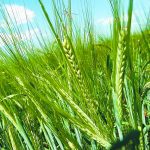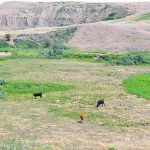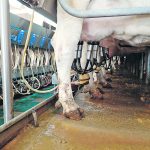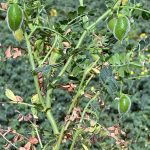It may feel that we are standing at a fork in the climate change road: do we focus on trying to solve the problem or do we concentrate on figuring out how to live with the new environmental landscape? Mitigation or adaptation? A recent report by Canadian agricultural economist Al Mussell comes down on the […] Read more
Tag Archives climate change — page 5

Climate change adaptation urged
WINNIPEG — Canadian farmers could benefit from climate change, says an agricultural economist from Ontario. That’s not a popular perspective, since mitigating climate change and reducing emissions from food production have become the main priorities in Canadian agriculture. However, Al Mussell is saying it, out loud. “Being at the northern fringe of viable agriculture globally, […] Read more

U.S. farm groups sue EPA over vehicle emissions
Canada has committed to a goal in which all new vehicle sales in the country will be zero emission by 2035
WINNIPEG — U.S. farm groups are suing the Environmental Protection Agency, claiming its policy on electric vehicles picks “one tool for fighting climate change over others.” On June 13 the American Farm Bureau Federation, the National Corn Growers Association, the American Petroleum Institute and a group of car dealers filed a lawsuit in the D.C. […] Read more
$5 million aimed at barley research
Glacier FarmMedia – The federal government has earmarked more than $5 million for barley research, aimed at creating more resilient varieties that can handle climate change. Federal Agriculture and Agri-Food Minister Lawrence MacAulay on June 12 announced $5,257,073 for the Canadian Barley Research Coalition. The funding echoes similar announcements for research clusters dedicated to commodities […] Read more

Feds announce early livestock tax deferral
Program has also been streamlined and buffer zones added to ensure eligibility
Glacier FarmMedia – Livestock producers in drought-affected areas are getting and early livestock tax deferral (LTD) for the 2024 season. The federal government said the situation has become more challenging for producers due to climate change, when announcing a list of regions eligible for the deferral on June 14. The LTD allows producers in designated […] Read more

Plants and bacteria: friends for 500 million years
WINNIPEG — Bacteria have been on earth for much longer than humans. The first ancestors of humans with the ability to walk on two legs arrived about four million years ago, says the Smithsonian Museum of Natural History. Related story: Yes, kids do need to get dirty In comparison, fossil evidence suggests that microbes and […] Read more

Half of world’s pastures degraded
SINGAPORE (Reuters) — Half the world’s natural pasture land has been degraded by exploitation and the impact of climate change, a United Nations body said May 21. The United Nations Convention to Combat Desertification (UNCCD) warned that a sixth of the world’s food supplies are at risk from deterioration of the world’s rangelands, which include […] Read more

U.S. firms invest in RNG project
REUTERS — Renewable energy firm Clean Energy Fuels says it will jointly develop renewable natural gas production plants at dairy farms across seven U.S. states in the U.S. with RNG producer Maas Energy Works. The project will collect manure from dairies with a combined herd size of about 35,000 cows, preventing methane emissions from entering […] Read more

India’s high pulse target questioned
SASKATOON — India is unlikely to meet its robust pulse production targets for 2024-25, according to a leading analyst from that country. The proposed target is 29.9 million tonnes of kharif and rabi pulses, up from an estimated 23.44 million tonnes this year, according to a story that ran in the Hindu Business Line. Related […] Read more

VIDEO: Myths swirl around livestock sector
If animal nutritionists don’t want to see their industry ravaged by misperceptions and misinformation, they might need to embrace what is an uncomfortable place for most of them, says a leading British nutritionist. If they can’t engage with the public on issues about feed’s and livestock’s effects on climate change and environmental degradation, then the […] Read more






